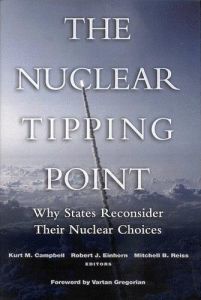Join getAbstract to access the summary!

Join getAbstract to access the summary!
Kurt M. Campbell, Robert J. Einhom and Mitchell B. Reiss
The Nuclear Tipping Point
Why States Reconsider Their Nuclear Choices
Brookings Institution Press, 2004
What's inside?
What could make nonnuclear nations consider nuclear arms? A. Regional sword play. B. Lack of U.S. support. C. Both.
Recommendation
This book stems from a three-year-long collaboration between the Center for Strategic and International Studies and the Reves Center for International Studies at the College of William and Mary. Scholars studied eight countries currently committed to nonproliferation - Egypt, Syria, Saudi Arabia, Turkey, Germany, Japan, South Korea and Taiwan - to determine what scenarios might make them change their minds. The objective was to study how the nuclear genie might get out of the bottle - but it also indicates ways to keep it contained. The book intentionally does not focus on proliferator states, such as North Korea or Iran. Even with that omission, getAbstract recommends it for the stark realities its research uncovers. One is that nonproliferating nations all look to the U.S. for reassurance that the world will stay safe for those without nuclear weapons. Another is that the world must stop Iran and North Korea's atomic ambitions, lest a tipping point occurs that would provoke other nations to conclude that their security requires swinging the biggest stick.
Summary
About the Authors
The book's editors are: Kurt M. Campbell, a former U.S. Deputy Assistant Secretary of Defense for Asia and the Pacific, and senior vice president and director of international security at the Center for Strategic and International Studies; Robert J. Einhorn, a former U.S. Assistant Secretary for Nonproliferation at the Department of State, and a senior advisor in the international security program at the Center for Strategic and International Studies; and Mitchell B. Reiss, former director of the Reves Center for International Studies at the College of William and Mary.



















Comment on this summary